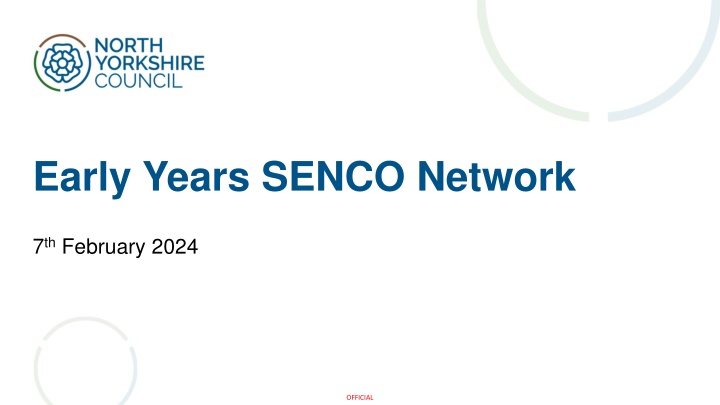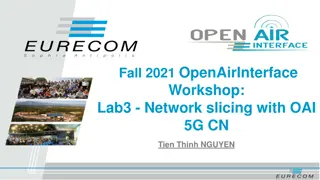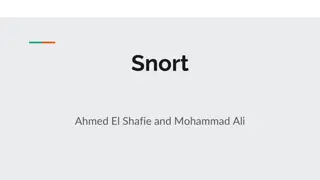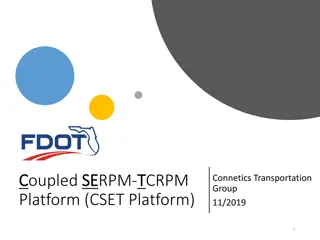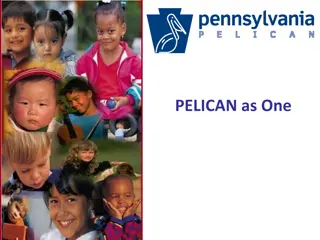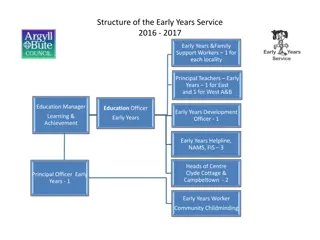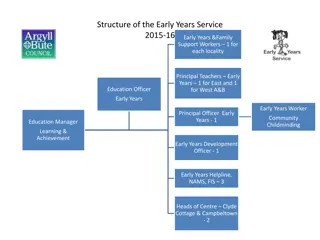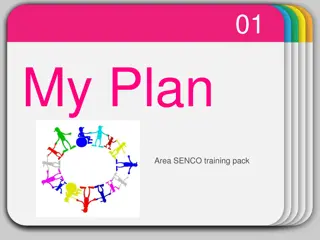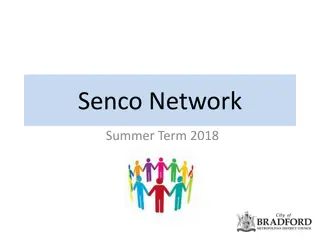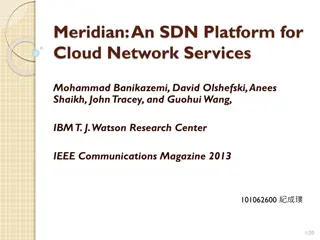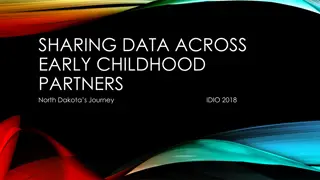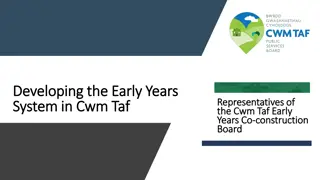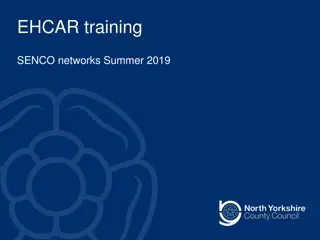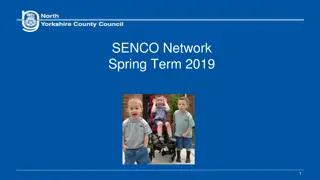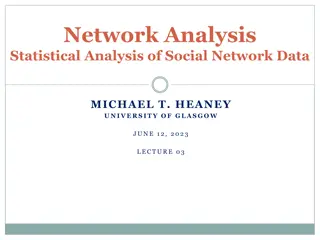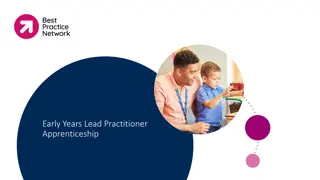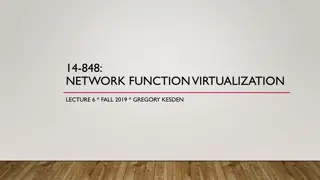Early Years SENCO Network.
The Early Years SENCO Network event held on 7th February 2024 covered a range of topics including Autism, SEND statutory processes, training opportunities, and development programs. Key figures like Charlie Lowe and Howard Staveley were highlighted along with the services provided by the SEN team. The event also showcased the roles of various managers in the EHC assessment team and outlined the services offered by the network, such as creating and maintaining EHC plans, conducting assessments, and supporting transition phases for individuals aged 0-25.
Download Presentation

Please find below an Image/Link to download the presentation.
The content on the website is provided AS IS for your information and personal use only. It may not be sold, licensed, or shared on other websites without obtaining consent from the author.If you encounter any issues during the download, it is possible that the publisher has removed the file from their server.
You are allowed to download the files provided on this website for personal or commercial use, subject to the condition that they are used lawfully. All files are the property of their respective owners.
The content on the website is provided AS IS for your information and personal use only. It may not be sold, licensed, or shared on other websites without obtaining consent from the author.
E N D
Presentation Transcript
Early Years SENCO Network 7th February 2024 OFFICIAL
Agenda Autism Central Programme SEND Statutory Processes DBV Transformation programme Dingley s Promise Locality Boards Training and development opportunities OFFICIAL
The SEN Team and Statutory The SEN Team and Statutory Processes Processes Charlie Lowe - Head of SEND OFFICIAL
EHC Assessment team Head of SEND Lead for SEND EHC Service Manager 4 Locality teams 1 EHC Locality Manager 4 EHC Casework Officers 1 Post 16 special school team 1 EHC Locality Manager 2 EHC Casework Officers OFFICIAL
Whos who? Charlie Lowe: Head of SEND Howard Staveley: EHC Manager Post 16 special Linzi Millward: Tribunals Lead Nicola Machon: Lead for SEND Anna Steven Oliver: EHC Manager - South Tim Palmer: EHC Manager - West Zoe Spink: EHC Manager - East Ramsbottom: EHC Manager - North OFFICIAL
What the service does Make and maintain EHC plans 0-25 service 20 week EHC assessment process 12 Annual Review process Phase transfers EYFS, Y6, Y11 Request statutory advice from Education, Health & Social care Place consultations to schools Attend annual reviews Information gather at review Signpost onto support services Consider amendments following review not at Process requests for personal budgets OFFICIAL
What dont we do Give advice non advisory service Deliver interventions Assess or observe children and young people Commission places in schools Build schools OFFICIAL
The Statutory EHC Assessment Process 1 2 3 4 5 6 7 8 9 10 11 12 13 14 15 16 17 18 19 20 Finalising EHCP Decision to Assess Information and Advice Gathering Parents at least 15 days to make representations Request advice from Educational Psychology, Health and Social care (Regulation 6, SEN regs 2014) Gather current information application form 15 day consultation period of schools Decision to assess made within 6 weeks Collate commissioned advice around week 14 to create a Draft EHC plan Final by week 20 Decision to issue EHC plan by week 16 OFFICIAL
Parent friendly timeline: EHCA OFFICIAL
Broad areas of need (6.27 CoP) These four broad areas give an overview of the range of needs that should be planned for. The purpose of identification is to work out what action the school needs to take, not to fit a pupil into a category. In practice, individual children or young people often have needs that cut across all these areas and their needs may change over time. For instance speech, language and communication needs can also be a feature of a number of other areas of SEN, and children and young people with an Autistic Spectrum Disorder (ASD) may have needs across all areas, including particular sensory requirements. A detailed assessment of need should ensure that the full range of an individual s needs is identified, not simply the primary need. The support provided to an individual should always be based on a full understanding of their particular strengths and needs and seek to address them all using well evidenced interventions targeted at their areas of difficulty and where necessary specialist equipment or software. OFFICIAL
Questions OFFICIAL
(Annual) Reviews At least annually, monitor the progress towards outcomes in conjunction with needs and provision are formally reviewed. Within 12 months of an EHC plan being issued Within 12 months following the previous review Pre 5 s Reviews held every 6 months A review can be called at any time but must be in line with section 20 OFFICIAL
Language of review Reviews can be called in an Emergency Exclusions guidance Interim reviews ceased to exist with statements (march 2018) Replaced with he graduated approach Section 6 of the code OFFICIAL
Annual review timeline: Regulation 20 Time Task Minus 6 weeks Build time send invites to all those involved and request any updated advice or reports If proposing amends to an EHC plan then use this time to bring those together with evidence Minus 2 weeks Share all documents with all parties invited including the family consider providing an agenda with key discussion points The review Person centred review discuss the CYP voice, Parent voice and progress towards the outcomes of the EHC plan. Week 2 Send all documentation to the Local Authority and all those invited Week 4 LA decide whether to keep amend or cease Week 12 If the decision to amend is made then the LA have 8 weeks to propose amendments to the EHC plan, parents have at least 15 days to make representations and 15 days for further consultation. OFFICIAL
Parent friendly timeline: AR OFFICIAL
Regulation 20 (2) who to invite? (a) the child s parent or the young person; (b) the provider of the relevant early years education or the head teacher or principal of the school, post-16 or other institution attended by the child or young person; (c) an officer of the authority (d) a health care professional (e) an officer of the authority who exercises the local authority s social services functions. OFFICIAL
Regulation 20 (2) who to invite? Some services may not be involved Some professionals may not be able to attend The duty is only to invite not to attend The LA cannot send an officer to every review OFFICIAL
Regulation 20 (4) (4) The person arranging the review meeting must obtain advice and information about the child or young person from the persons referred to in paragraph (2) and must circulate it to those persons at least two weeks in advance of the review meeting. OFFICIAL
Requesting Updated Health Advice Schools need to know from parents/carers which health providers are involved in their child or young persons health care Schools can then send a request for health advice via the NHS Trust s Single Point of Contact (SPoC) email address Request needs to state who request is for e.g. SALT, OT, physio, epilepsy nurse Send the EHCP with the request for advice Health practitioner can review the health advice currently written in the EHCP E.G. SALT can review SALT advice in the EHCP and provide up to date advice OFFICIAL
Types of meeting Consider where the meeting will take place to get the best outcome. Consider whether the space is big enough, does the IT work, is there room for flipcharts etc Consider how the meeting will take place Enable parents and the child or young person to have their say does your arrangements encourage them to do this? Do parents and YP know how they can be supported? OFFICIAL - SENSITIVE
Pupil voice 1.10 CoP 2015 Local authorities must not use the views of parents as a proxy for young people s views. Young people will have their own perspective and local authorities should have arrangements in place to engage with them directly. CYP views can only be from the Child / Young Person Aspirations must be personal which create the OFFICIAL
At the meeting Take account of the views, feelings and wishes of the child, young person and parent Remember 1.10 of the code Reflect on the progress towards the outcomes of the EHC plan Have outcomes been met? If so this should be articulated in the pre review pack and outcomes suggested before the review to discuss Long term 4 year cycle Medium term 2-3 years Annual outcomes for internal use only Graduated approach OFFICIAL
At the meeting 2 From year 9 on wards at the very latest! Consider what provision is required to help the child or young person prepare for adulthood and independent living PFA can be discussed within the early years Discuss any proposed amendments you have made to the EHC plan Ensure this was distributed two weeks prior to the meeting N.B. ensure your cross reference amends with professional reports i.e. (Lowe, Salt report, page 3) Review any arrangements for direct payments OFFICIAL
Children in Care Ensure that the EHC plan Annual Review coincides with one of the Care Plan reviews, e.g. PEP which feeds into review of the wider Care Plan. Work closely with social workers to ensure that transitions from being looked after to returning home are managed effectively. OFFICIAL
Review extras The review ethos is the whole process from the graduated approach to the review meeting It is the date of the annual review meeting which dictates the date by which the next annual review (meeting) must be completed. Minor amends need to be backed up with a graduated approach Significant amends need to be supported by a suitably qualified professional OFFICIAL
Common Problems reported by Parents No real notice of meeting Reports are not prepared and/ or distributed in enough time for proper consideration and comment before the meeting Surprises sprung on parents at meeting Parents' views not recorded The annual review report goes to the LA but the LA either does nothing or does not inform the parent/young person of their decision OFFICIAL - SENSITIVE
EHC team Sufficiency study Additional staffing capacity + 7 1st April Service remapping School post code model Recruitment 5 x perm EHC Casework Managers 18 x perm EHC Casework Officers 8 x perm EHC Assistant Casework Officers OFFICIAL
Service Review Statutory Assessment Annual Reviews Consultation Decision Making and the Law Communication Data Quality Assurance OFFICIAL
The first term FR9: EHC Service CPD / training schedule in place (4.1) Communication, QA, AR, Mediation Communication promise (4.1) Staff handbook v1.1 (4.1) CYPLT report and recruitment (4.1) QA group established (4.1) QA Matrix under review Gateway 1 and 2 refresh project (4.8, 4.1) Regulation 4(2) Decision making (4.2) K forms reviewed Annual Review documentation reviewed (4.1) Consultation process (4.1) Letter coproduced Parent events (4.1) Focused review underway Workshops process mapped service with a statutory, partner and comms focus Topics covered include: Initial assessment and annual review processes; Decision making and the law; Mediation and Tribunals; Commissioning; Customer experience and communication Workshop outputs are helping to validate existing opportunity areas OFFICIAL
The future 02.24 G1 & G2 training session 02.24 Feedback from focussed review 03.24 Schools focussed group trialling Draft AR form 04.24 New Locality structure 04.24 Revised ECHAR forms distributed 05.24 Revised AR paperwork distributed 06.24 QA Matrix v2.0 finalised 06.24 Training EHCAR and Annual Review 07.24 Further parent voice sessions completed OFFICIAL
DBV and developments OFFICIAL
The system finances Funding doubled Plans increased by 3 fold since 2014 Specialist places increased by 50% since 2017, 350 more in the pipeline OFFICIAL
DfE Funding to North Yorkshire NY currently receives 71m from the DfE in the High Needs Block (HNB) a portion of the Dedicated Schools Grant (DSG). This pays for mostly EHC Plans, special schools, Independent placements and some specialist support (over 95% funds provision). We are funded at 142nd out of 151 Local Authorities. (revenue per head); We currently have a 10m accumulated deficit as at 31/03/23 On current unmitigated projections, this will grow over the next few years. OFFICIAL
Funding continued We get 644 per pupil, (top funded LA gets 1,154) At average LA (75th/151), we should get 18m more per annum. 34 LAs are so overspent on their HNB, they are part of a DfE scheme called safety valve andhave jointly been awarded 1bn of extra funding. Over 50 more LAs, including NY are in the next DfE scheme called Delivering Better Value (DBV) in SEND. We have applied for 1m transformation grant outcome in March 2024 but cannot use to directly offset the deficit. OFFICIAL
Converting Workstreams into DBV Implementation Grant application Grant application to access up to 1million of grant funding (fixed sum for all authorities in the DBV process) Criteria are stringent emphasis on (a) informed by evidence bases from DBV Module 2 and (b) stakeholder engagement Grant funding has to be deployed between approval date (anticipated March 24) and an end point of March 25 OFFICIAL
Specialist Teacher- Transitions Support (engageats.co.uk) Specialist Teacher- School Focused Support (engageats.co.uk) Specialist Teacher- Ordinarily Available Support Project (engageats.co.uk) OFFICIAL
SEND and Inclusion Transformation Activities OFFICIAL
Transformation Programme: Four broad areas of activity Area 1 :- Funding decision making Area 2 :- Confidence in the mainstream offer/Developing Inclusive Communities Area 3 :- Provision related opportunities Area 4 :- Statutory SEND processes OFFICIAL
Confidence in the Mainstream offer/Developing Inclusive Communities (DBV Grant funded) Alongside support at point of transition from Nursery to reception for children with autism, related complex social communication needs or significant learning disability Transition from Y5/Y6 to Y7 and secondary school for children including those with autism or related complex social communication needs, or a range of presenting needs leading to perceived vulnerabilities at the point of transition Focus on individual cyp at point of transition engagement with parents and school staff including understanding assets and concerns, utilise consultation, multiagency solution focussed consultation, conversations, training or modelling of approaches, sensory audit etc. Model launched March 24 CYP Identified and contact with families and setting made March 24 OFFICIAL
Inclusion Review and Quality standards/Pledge School SEND/Inclusion standards focussing on evidence and practice learning and teaching the curriculum offer and adaptations the sensory, social and physical environment approaches to promoting positive behaviour legal duties and adaptations Funding and provision mapping Embedding cohort screening to meeting needs Inspection frameworks Model launched March 24 Work with parent/carers, school leaders and Education and skills to develop audit process and tool Staffing will include: Senior Education Advisor, SEN support , 2 seconded sencos, business support Will build on existing good practice Develop Inclusion in North Yorkshire quality mark or pledge Develop standards and review process Celebration event Peer to peer learning opportunities OFFICIAL
Alongside Hub Support Redirect some Hub support Enhanced support short term Each school has guaranteed access to support Named person Menu of options Earlier support To be reviewed Spring 25 OFFICIAL
Key messages Inclusion and inclusive communities Parent carer confidence Earlier identification and meeting of need Timely and positive communication Responsibilities and legal duties OFFICIAL
